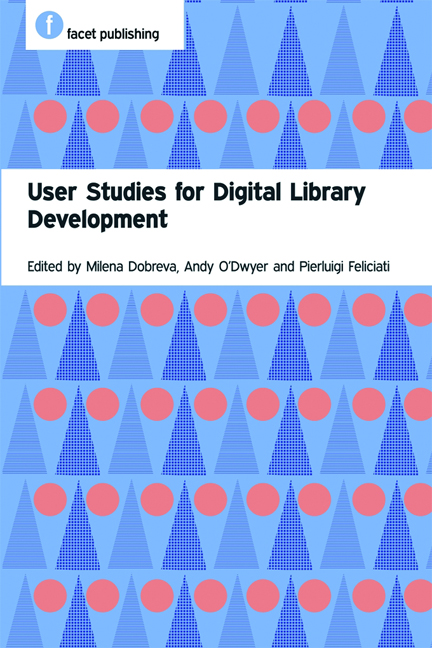Book contents
- Frontmatter
- Contents
- Preface
- Acknowledgements
- Abbreviations
- Glossary
- 1 Introduction: user studies for digital library development
- PART 1 SETTING THE SCENE
- 2 Models that inform digital library design
- 3 User-centric studies
- 4 Design issues and user needs
- 5 Users within the evaluation of digital libraries
- PART 2 METHODS EXPLAINED AND ILLUSTRATED
- PART 3 USER STUDIES IN THE DIGITAL LIBRARY UNIVERSE: WHAT ELSE NEEDS TO BE CONSIDERED?
- PART 4 USER STUDIES ACROSS THE CULTURAL HERITAGE SECTOR
- PART 5 PUTTING IT ALL TOGETHER
- Index
3 - User-centric studies
from PART 1 - SETTING THE SCENE
Published online by Cambridge University Press: 08 June 2018
- Frontmatter
- Contents
- Preface
- Acknowledgements
- Abbreviations
- Glossary
- 1 Introduction: user studies for digital library development
- PART 1 SETTING THE SCENE
- 2 Models that inform digital library design
- 3 User-centric studies
- 4 Design issues and user needs
- 5 Users within the evaluation of digital libraries
- PART 2 METHODS EXPLAINED AND ILLUSTRATED
- PART 3 USER STUDIES IN THE DIGITAL LIBRARY UNIVERSE: WHAT ELSE NEEDS TO BE CONSIDERED?
- PART 4 USER STUDIES ACROSS THE CULTURAL HERITAGE SECTOR
- PART 5 PUTTING IT ALL TOGETHER
- Index
Summary
Introduction
As digital libraries (DLs) become a major source of information for many people, we need to understand better how people seek and retrieve information in digital environments. Information behaviour and information search models (see Chapter 2) help to contextualize the work on a particular DL within the larger area of use of digital resources. Usercentric studies build on users’ information needs and informationseeking behaviour and help in the formulation of specific requirements, and can be extremely helpful at different stages of DL development. These studies became popular in the late 20th century after decades of research that focused on better digital object representation or that was systemcentric. User studies do not neglect the data models and technological developments, but place the focus on methods directly involving the users, with the rationale that this will help to develop systems that meet users’ expectations and needs. Usercentred design, according to Normore (2009), involves two approaches: user analysis in the early stages of a project, and usability research during the later stages. Through development of use cases and scenarios, usercentric methods become part of the important frontend activity for DL development. They also help to pinpoint any areas that need to be improved in terms of system design and services, and new usability features to help users perform information seeking in an effective and efficient manner. The usability of a DL relates primarily to its accessibility, i.e. how easily users can interact with the interface of the DL, how easily they can find useful information and how easily they can use the retrieved information. In general, if information can be accessed easily, then the DL will be used frequently and is likely to have a more noticeable impact and value for users.
This chapter discusses some major issues and research on user and usability studies in DLs. It then discusses four studies: Digital Work Environment (DWE); REtrieval of VidEo And Language for The Home user in an Information Society (REVEAL THIS); evaluation of SCRAN, a Scottish DL for educational use with specific focus on ‘value for money’ for endusers; and the Europeana functionality study. These studies were done during the last decade and illustrate how specific situations require the specifics of the DL concerned to be addressed.
- Type
- Chapter
- Information
- User Studies for Digital Library Development , pp. 33 - 42Publisher: FacetPrint publication year: 2012



